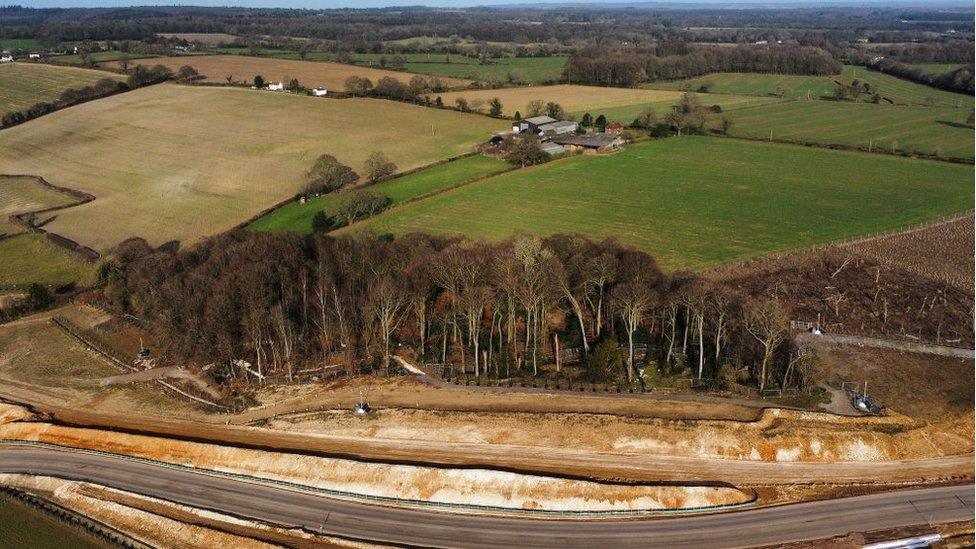HS2 leaves Midlands communities with 'hostility' and mixed feeling
- Published
Drone footage shows HS2 works travelling from Warwickshire, to Birmingham through to Staffordshire and back again.
HS2's rising costs and impact on the countryside continue to prompt accounts of anxiety, "open hostility" and also mixed feeling among nearby West Midlands communities.
As construction on the high-speed rail line reaches its peak, the BBC has been gauging the opinions of residents, small businesses and volunteer groups along the project's 140-mile Phase One route.
While the line seeks to better connect a swathe of the country via faster journeys, its neighbours have faced years of disruption as the scheme progresses. And with things possibly not opening until 2033, some are forecasting another decade of pain.
The Department for Transport says it is committed to minimising disruption, adding that passengers and communities alike are set to benefit for years to come.
In the meantime, the latest price tag of HS2 has grown from the £33bn outlined in 2010 to at least £71bn.
Earlier this year, Transport Secretary Mark Harper announced the Birmingham to Crewe stretch would be delayed by two years due to higher inflation, which some in the rail industry warned would further increase costs.

Mustafa Karakaya said he could see long-term benefits from HS2
We started our journey in Southam in Warwickshire, speaking to people in the town about HS2 itself and ongoing traffic disruption as construction work continued.
The rail route's southern section there includes two viaducts in the Radbourne area and enters a tunnel underneath Long Itchington Wood, a couple of miles away.
At Groom and Gents Barbers, owner Mustafa Karakaya said he remained in two minds about the project.
"The construction traffic and closures outside Southam have been problematic - in case of emergency it takes time for ambulances to arrive. There have been issues there.
"But I believe in the future HS2 will bring benefits for the country, for connecting bigger cities like Birmingham and London."
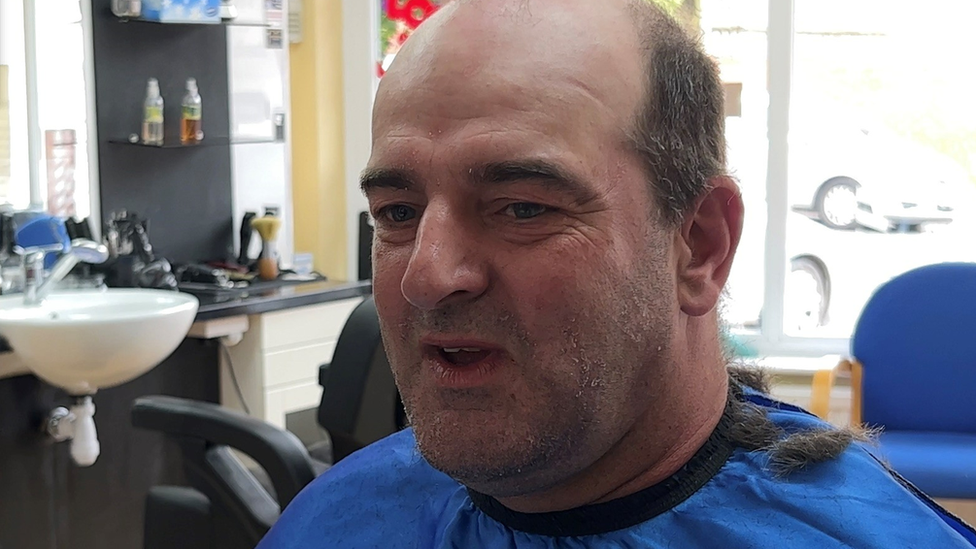
Tony Bromwich said he had received a lot of complaints about HS2's cost and disruption
Tony Bromwich, an independent councillor who represents Southam West on Stratford District Council, said his inbox was full of people complaining about the spiralling cost of the project.
"They're saying it's a white elephant which benefits only those travelling to London and saving them 20 minutes. People think the money could be better spent elsewhere.
"There's also a lot of open hostility to the disruption the construction is causing."

Chloe Wan said the benefits of HS2 did not outweigh the damage to the environment
In Burton Green, near Kenilworth in the county, we dropped into a parent and child "stay and play" session at the new village hall, which opened in March after HS2 provided £2m of funding.
It was built near a greenway where a portal for a 700m rail tunnel is being constructed.
Locals have been told that within a decade the tunnel will be covered in trees and plants; a green canopy if you will, "sensitively" built into the landscape - one of the 119 new wildlife sites that have already been created.
However, as parents were enjoying some quality playtime with their toddlers, we found many feeling conflicted about the merits of Britain's biggest rail project.
"It's a lovely facility, it's nice and airy and beautiful," said parent Chloe Wan on her first visit to the new hall.
"But it's a real shame that so much has been taken from the communities that it has disrupted.
"Taking minutes off a train journey is not worth the devastation it's had to the environment."
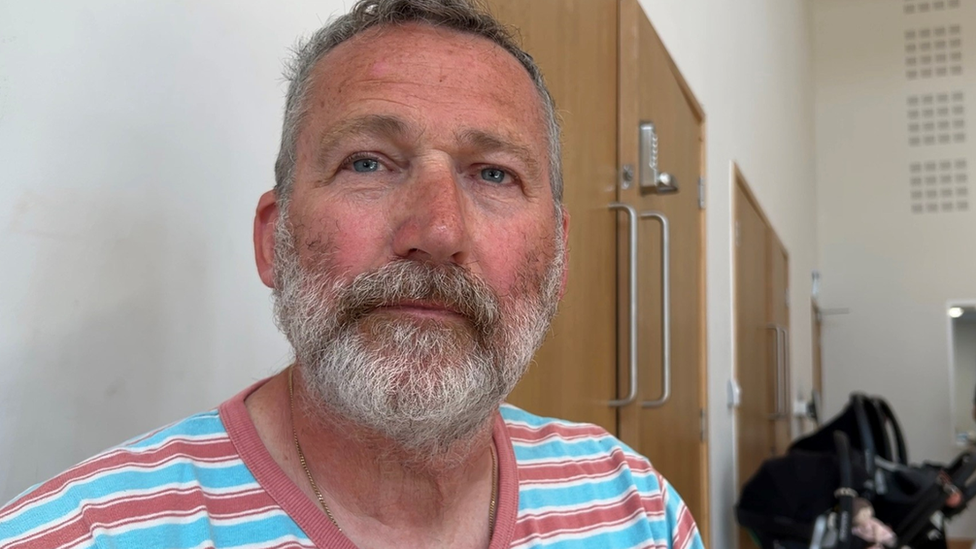
Adam Zielski said he had been affected by road closures and noise
Another attendee, Adam Zielski, a grandfather, said he was not convinced of the wider benefits of HS2.
"I think it's a vast amount of money that's been spent that could have been spent better elsewhere.
"It's affected us - when we want to travel around there have been road closures and noise disruption."
More than 30 homes were bought up by HS2 in Burton Green, according to village hall trustee Paddy Deeley.
"The fights and protests against HS2 have been going on for a long time," she said.
"It's not going away so yes, there is that conflict. I think most people would have said 'given the choice, we would not have had HS2 - but we have.
"[For us] it was a case of mitigating the effects and getting the best hall that we could."
And of that provision, Ria Burgoine said her Mama's Mindfulness sessions had become more popular since they started using the venue.
"It's certainly brought a new dynamic to the session, having amazing social media photos, being able to showcase such a beautiful hall," she explained. "It's brought more people here from far and wide."
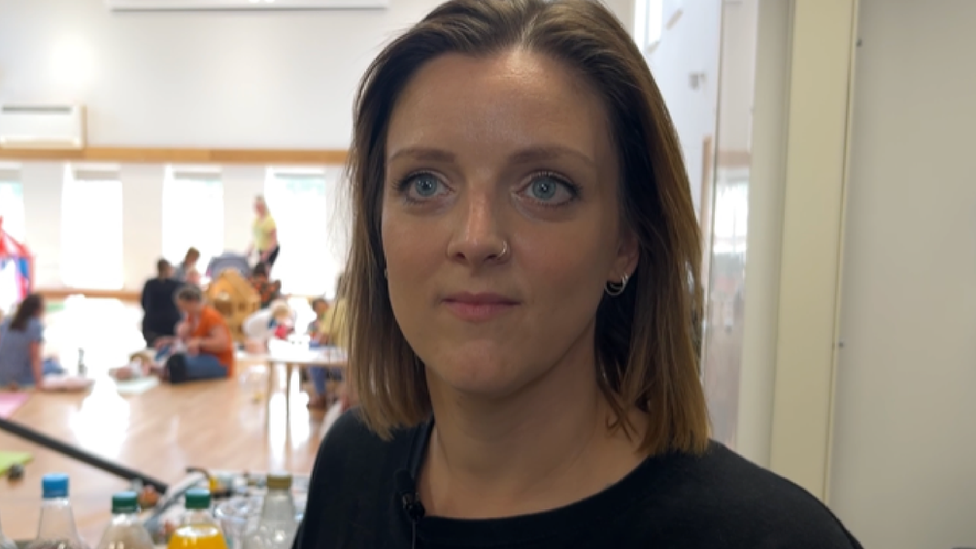
Ria Burgoine is grateful for her new local village hall, paid for by HS2
The family-run Lavender Hall Fishery at Berkswell, Solihull, is a serene haven for anglers, though the drills and rumbling trucks puncture the silence.
There, high speed trains will pass along the Balsall Common viaduct, around 10 metres above ground level, taking out a section of fishing lake on the property's perimeter.
"In terms of noise, it's bad enough now with the construction work and it's going to get worse," said angler Mark Luckett.
"It's killing everything off and who is going to gain out of HS2? I'm not. All it's going to do is to make it easier for the rich and the wealthy to get down to London a bit quicker."

Fishery manager Tom Lawrie said his cafe had benefited from serving HS2 workers
HS2 said the landscape design for the viaduct aimed to minimise the impact on the landscape, on local ecology and on views of the countryside, and would be enjoyed by people and enhance existing habitats.
Fishery bosses have been preparing for life after the route arrives. Once realised, a haven of five lakes will effectively sit between HS2 and an existing network rail line.
"The one positive for us," said manager Tom Lawrie, "has been our café on site - the amount of business we get now from HS2 workers has been great.
"But the negatives remain: How close it is, the noise, the visual impact. Some days you don't really notice it too much, then other days they are really quite noisy."
He added: "I think for a country of our size with the existing rail network, we could have probably upgraded that and spent the money elsewhere."
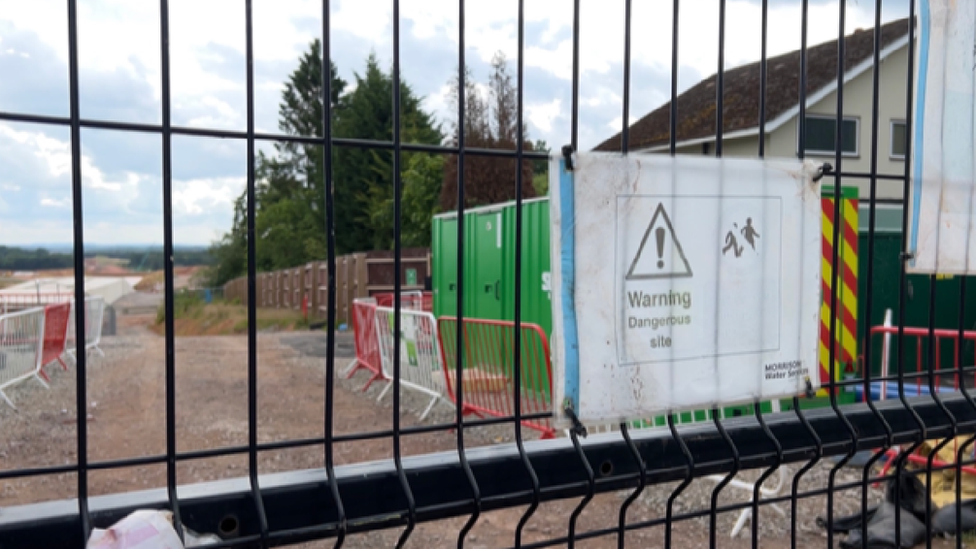
Construction work could last at least another decade
The approach of peak construction is arguably a defining moment for the project, with the CEO of HS2, Mark Thurston, announcing he will step down from the role in September as the scheme moves into a new phase for the installation of track and signalling equipment.
MPs earlier this month urged ministers to "finally establish" what their plans were for Euston. Connectivity with the central London station is the final leg in the south, but the government paused that work due to rising costs.
Even so, major construction is currently taking place at more than 350 sites between London and the West Midlands in a project that employs 28,500 people across the country.
The Department for Transport said: "The construction of HS2 will bring transformational benefits to passengers and communities for generations to come.
"We recognise the impact that some residents may be facing and are committed to minimising disruption as much as possible."
It added: "Local impacts are unavoidable on a project this scale, and with construction reaching its peak these impacts will be felt more than ever.
"Nonetheless, communities remain at the heart of HS2's delivery plans."
It also said it would continue to consult on the construction and took monitoring of the work seriously.
HS2 Ltd, the company delivering the project, said: "We are committed to minimising impacts on local communities wherever possible and we work hard to reduce disruption during the construction of HS2."
It said that included creating temporary internal access roads to get heavy vehicles on to site, using freight trains to deliver materials, and conveyors to remove spoil, which helps to take lorries off local roads.

Follow BBC West Midlands on Facebook, external, Twitter, external and Instagram, external. Send your story ideas to: newsonline.westmidlands@bbc.co.uk, external
Related topics
- Published14 March 2023
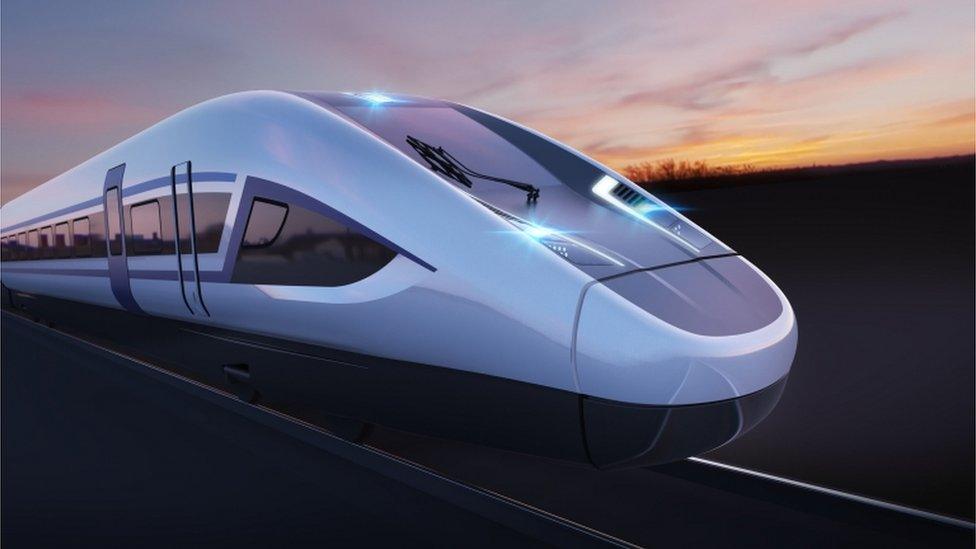
- Published10 March 2023
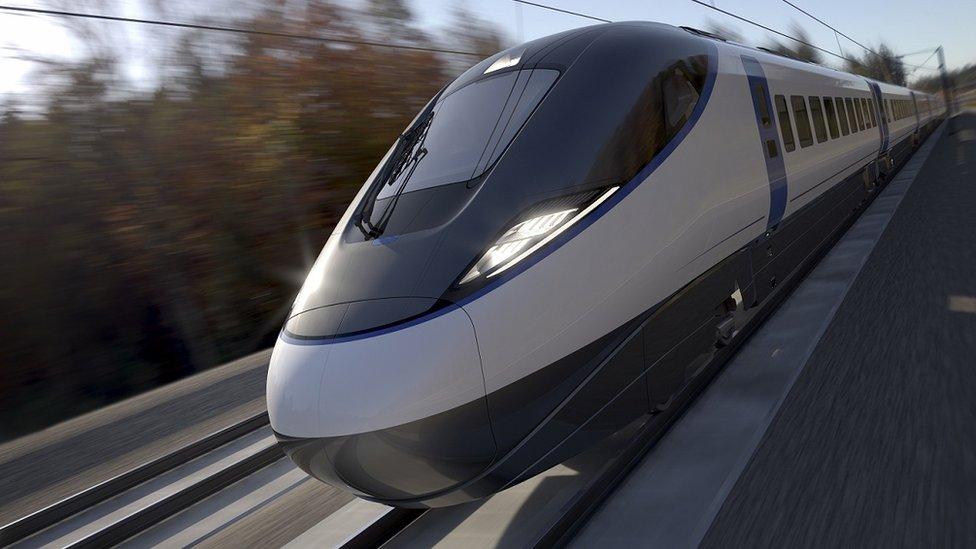
- Published9 March 2023
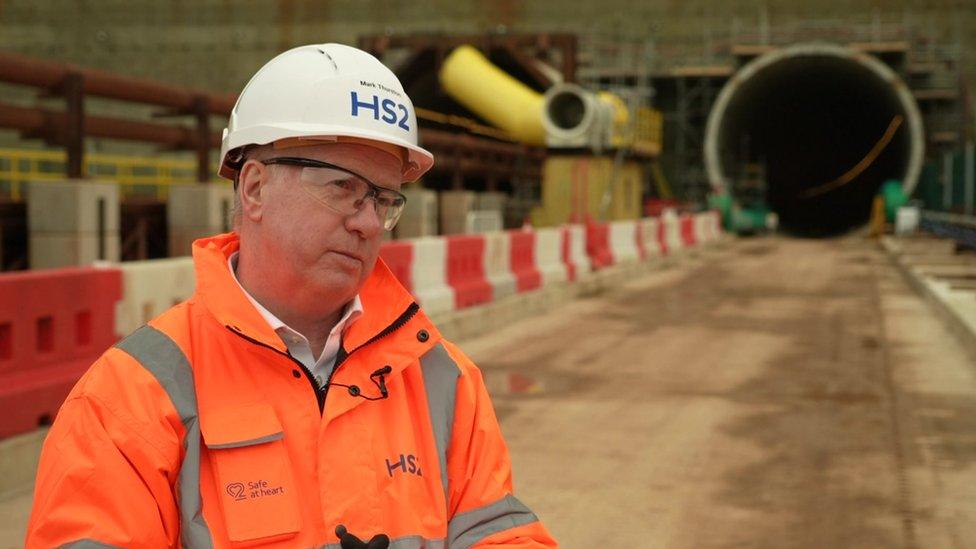
- Published8 February 2023
